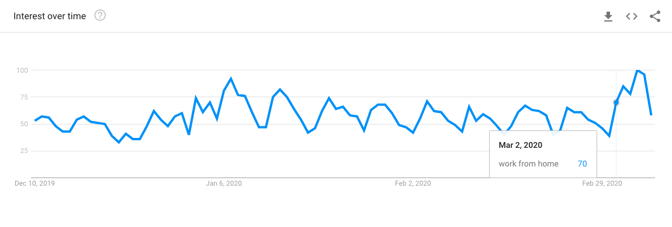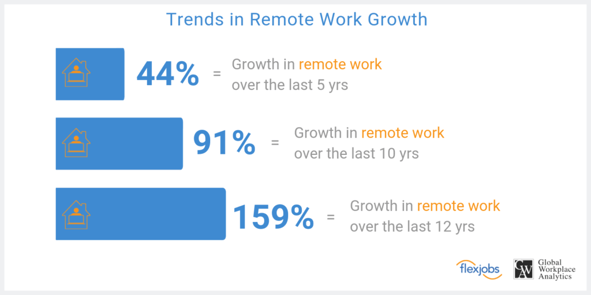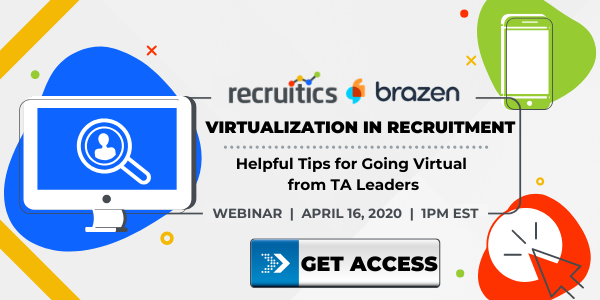The World Health Organization has officially labeled Coronavirus, or COVID-19, a pandemic -- a term director-general Tedros Adhanom Ghebreyesus noted “is not a word to be used lightly.” The highly contagious illness has now spread to more than 100 countries with no signs of slowing down any time soon.
Health organizations around the world are strongly advising employers to be prepared with action plans to protect employees. Disruptions and upheaval caused by an international health crisis of this scale are bound to have a far-reaching impact on businesses, and the recruitment marketing industry is no exception.
Here are some of the adjustments we’re already seeing, some that might be coming down the road, and what all of this could mean for the recruitment marketing industry as a whole.
GET ACCESS TO THIS WEBINAR ON DEMAND
5 ways coronavirus could impact recruitment marketing
1. Crowding concerns are leading to less business travel more remote work and/or time off
By nature, office environments involve an abundance of close contact in confined spaces. Employees who typically commute to work via public transportation run an even higher risk of exposure to infectious illnesses like COVID-19. To combat fears around traveling and crowds, many businesses are placing tight restrictions on any unnecessary business travel (particularly international travel.) Many are also encouraging -- or even mandating -- that employees work remotely as opposed to on-site. Twitter, Apple, Facebook, and Google have all recently released memos strongly encouraging employees to work remotely, while the recruitment industry giant Indeed has mandated that all employees work from home until further notice.
While the increased risk of exposure to illness in an office environment plays a significant role in this shift from on-site to remote work, it’s not the only contributing factor. School and daycare closures are complicating daytime childcare arrangements for working parents of young children, who must either stay home to provide care for their children or search for alternative care arrangements.
According to Google Trends (and as one might expect), interest in the term “coronavirus” has been high worldwide and continually climbing since the end of January:
.png?width=660&name=Screen%20Shot%202020-03-10%20at%2011.42.41%20AM%20(1).png)
There was a noticeable spike in searches for the term “work from home” beginning around the same time (early January), and with an even larger surge in interest over the past several weeks:
 This situation is forcing organizations who previously did not have the infrastructure to allow employees to work from home to develop one as quickly as possible. While such a large change can be initially daunting to put into place, once the appropriate structure and processes are in place, an organization may be in a better position to explore and support future remote work opportunities.
This situation is forcing organizations who previously did not have the infrastructure to allow employees to work from home to develop one as quickly as possible. While such a large change can be initially daunting to put into place, once the appropriate structure and processes are in place, an organization may be in a better position to explore and support future remote work opportunities.
However, certain jobs cannot be performed remotely and certain organizations cannot adapt their processes or work environment to accommodate employees who wish to work from home. In these situations, companies are generally relying on employee leave to limit risk of exposure. Some organizations have expanded their paid leave policies to improve accommodations around the virus, some are recommending employees to conserve or take time out of their existing paid leave allotment, and others have recommended (or mandated) that employees take unpaid time off.
The number of people working remotely has already been on a steady incline for years, with a special analysis by FlexJobs and Global Workplace Analytics concluding that remote work in the U.S. has increased 44% over the last 5 years and 159% since 2005. If companies (or employees) become more comfortable with remote work as a result of these current safety measures, we could see this figure grow even further.

For recruitment marketers, this could mean the ability to offer more remote work opportunities in the future and to advertise jobs with that huge added perk. According to a 2019 study from Owl Labs, 77% of respondents agree that "after COVID-19, being able to work from home (WFH) would make them happier," and "1 in 2 people won’t return to jobs that don’t offer remote work after COVID-19."
For many employees, this may be their first experience working from home (apart from the occasional sick day.) If more employees are given the opportunity to work remotely during this health crisis and find it to be a positive experience, we may see an increase in employees seeking remote work or pushing for more remote work potential in their current roles.![]()
Once people start working from home, they’re statistically more likely to want to work from home more frequently in the future. According to the same Owl Labs study, 42% of workers who already work remotely at least part of the time said they plan to work from home more often in the next 5 years, and 55% said they would be likely to look for a new career opportunity if they were told they could no longer work remotely. If employees get accustomed to working from home, rescinding the opportunity could lead to higher rates of employee dissatisfaction and lower retention.
Helpful Resources:
- Put Your Pants On! Plus 5 Other Tips to Successfully Work from Home
- How to Hire & Manage Remote Employees
2. Uncertainty and change may prompt more employees to explore a career change
Whether they’re working remote or on an extended leave, workplace safety policies are likely to leave a lot of employees with more time on their hands than usual. Chaotic and changeable situations have a way of opening our eyes to new perspectives, and it’s easy to find yourself reevaluating your priorities, current situation, and outlook on the future.
If an employee finds that their position, industry, or income earning opportunities are uncertain, they may begin using their extra free time to explore new career opportunities. This could be particularly true for those in industries that are feeling the pain associated with these changes (like the hospitality and travel sectors) or employees on unpaid leave who need a new source of income (like hourly retail or service workers). Should they believe COVID-19 has the potential for long-term negative effects in their industry, workers may look to change sectors, and those who don’t have the option to work remotely in their current role or company could seek a new position where they would have this opportunity.
Plus, if an employee had already been contemplating a career move, they could be bolstered in a sense by the current uncertainty, thinking: “If huge changes to my working life are inevitable anyway, why not take the steps to make a positive change that’s within my control?”
Mortgage interest rates also hit an all-time low recently, and according to Market Watch, this was likely the result of a “steady decline in bond yields in response to concerns about the economic impact the COVID-19 coronavirus outbreak would have.” Lenders have received tidal waves of mortgage applications from people looking to capitalize on these reduced rates, which may mean that we’ll also see a higher rate of relocation in the near future. Those who have recently relocated may seek new positions that are closer to their new home or opportunities that offer remote work potential.
For recruitment marketers, this could mean more online job seeker activity as candidates explore career changes, work in new locations or industries, or positions that may offer more stability or greater opportunities for remote work - of course, depending on industry. Paying close attention to all your job ad performance data to look for changes in demand and traffic is crucial, as these factors may have a huge impact on the budget and spend you need to allocate toward certain positions.
3. Some industries are combatting profit loss with hiring freezes
As we’ve already discussed, some industries are facing a particularly high impact to their bottom line and potential revenue as a result of COVID-19. Travel restrictions, quarantines, and more people avoiding crowds/public spaces have all caused significant reductions in demand for companies in industries like travel, hospitality, brick and mortar retail, food service, event coordination, and more.
This is almost certain to reduce or even halt hiring initiatives for many organizations in these sectors, at least temporarily. As ZipRecruiter labor economist Julia Pollack recently told The Washington Post, “We will definitely see an effect on jobs from the coronavirus, and it could be pretty large in leisure and hospitality,” adding that she had been getting “many reports of employers canceling staff everywhere.”
Meanwhile, other organizations have gone a step beyond hiring freezes and have begun cutting staff. The first round of Coronavirus-related layoffs are already underway in the U.S., particularly in major metro areas like Seattle, Los Angeles, New York, Las Vegas, and Orlando.
Job boards and aggregators (both niche and general) could see a decline in the number of jobs posted and recruitment advertising spend as more companies put their hiring initiatives on pause. Job postings for positions in travel, hospitality, and other sectors experiencing decreased public demand may also lose some of their appeal for candidates wary of the instability and uncertain outlook, which could cause a dip in traffic and performance for any jobs that are being posted during this time.
That said, in complex times, there’s an opportunity to showcase an organization's employer brand through how they support and communicate with employees. Recruitment marketers and employer brand professionals should leverage the appropriate employer brand initiatives and channels in a thoughtful way.
Featured Resource:
4. Other industries can’t hire fast enough to meet increasing demand
On the flip side, not all industries are experiencing the impact of the Coronavirus as reduced demand. The healthcare sector in particular is facing a dramatic increase in activity as they attempt to combat and contain the spread of the illness. This means a higher workload for staff at all levels, whether they are directly dealing with patients, providing at-home care services, researching the virus, or managing hospitals or health centers, an international pandemic is an “all hands on deck” situation.
There are three primary reasons this could cause increased hiring demand in the health sector. First, additional staff may be needed to support overworked and overwhelmed employees. Second, backfills may also be required if there are issues around employee retention. Healthcare workers on the front lines have reported growing concerns over their safety, and in some hospitals and care facilities, employees who are directly exposed are being put on mandatory quarantine for 14 days, leaving unpredictable gaps in staff.
Lastly, as mentioned previously, healthcare workers who are parents may need to take time off for childcare in the event of school and daycare closures. According to Michael Osterholm, the director of the Center for Infectious Disease Research and Policy at the University of Minnesota, studies have found that around 35% of nurses are parents to school-age children. If they can’t find alternative childcare, medical professionals with young children will need to take time off, again causing unpredictable gaps in staff.
Health insurance companies are facing a similar strain on labor, and on-demand organizations that offer home delivery services are likely also going to see an increase in demand as more people are staying in their homes and requesting home delivery of meals, groceries, products, medicines, and more. While some segments of the manufacturing industry are taking a hit in terms of reduced consumer demand, manufacturing companies that produce health and safety products (like gloves, masks, respirators, hand sanitizer, and cleaning products) have kicked operations into overdrive to compensate for drastically increased demand and subsequent product shortages.
Earlier in March, manufacturing titan 3M announced that they would be ramping up production on respirators to account for increased global demand, which would involve hiring additional staff, adding shifts for existing staff, and opening more production lines. However, they acknowledged that even with increased around-the-clock production, they “expect demand for respirators and other supplies to outpace supply for the foreseeable future.”
All of this will likely mean an increased focus on hiring, employer branding, and overall recruitment marketing spend within industries experiencing higher staffing demands, like healthcare companies and hospitals, on-demand marketplace organizations, health and safety product manufacturers, and more. In their economic research report on the impact of COVID-19 for employers and employees, Glassdoor notes that they are already seeing an increase in job postings for healthcare professionals and researchers, as well as more openings for communications specialists and public relations representatives with experience in the healthcare field.
Niche job sites catering to the healthcare sector could see an even larger boom in postings and spend, but this boom will also likely come hand in hand with new challenges. A higher volume of job postings for similar roles will mean more competition, and getting the attention of a limited, highly in-demand candidate pool will probably come at a higher cost than usual for employers.
5. Schedules for onsite interviews, hiring events, and industry conferences are changing (or going virtual)
For companies that are still hiring, health concerns are going to throw a real wrench in scheduling and coordination of any planned onsite interviews, hiring events, or career fairs. The same can be said for recruitment marketing industry events and conferences (and really, all industry events and conferences - as we saw with SXSW), which are experiencing the ripple effect of COVID-19’s blow to the event coordination and event management sectors.
Major industry events (like SIA Executive Forum, TalentNET Live, Talent Brand Summit, SHRM, and many others) have been cancelled, postponed, or shifted to virtual platforms (such as webinars, online videos, or podcasts). We may see employers attempting to adapt to these changes make a similar shift to the digital realm for their hiring events and career fairs, as well as their onsite interviews. ![]()
Virtual event providers like Brazen and RXInsider and video interviewing solutions could see an increase in demand and traffic. Should virtual career events and video interviews prove a success for the employers who begin leveraging them, it’s possible they may look for ways to incorporate these tactics into their recruitment marketing strategy long-term as an addition to in-person events and onsite interviews.
Featured Resources:
- How To Host a Virtual Career Fair Without Leaving Your Desk
- Don’t Waste Time! 10 Tips for Implementing Video Job Interviews
- HR and Recruitment Conferences Postponed or Canceled
WRAPPING UP
The Coronavirus outbreak is a sensitive subject, and it’s certainly a cause for caution and concern. The current upheaval and uncertainty is sure to result in changes to day-to-day business and strategic planning that may be stressful, but keep in mind that there are always silver linings, and not all changes will have a negative outcome in the long term.
We’ll undoubtedly develop a clearer understanding of how the current situation will impact recruitment marketing as things continue to unfold. For now, the best recourse is to focus on staying healthy (and for employers, helping your employees stay healthy), adapting to the changes we’re already seeing, and approaching potential changes with as much flexibility as possible.
Finding proactive solutions to these obstacles as they arise will be an all-hands-on-deck challenge for talent acquisition professionals. Now is the time to ensure you have open and direct communication with everyone involved in the development and execution of your recruiting strategies, including vendors and recruitment marketing partners and agencies. Making sure everyone is on the same page and has up-to-date information on the current situation will put you in a much better position to adapt your plans in a timely manner as things continue to change.
Are there any industry impacts you’ve experienced that we may have missed? Join the conversation by sharing your thoughts with us on twitter, or by sending us a note. Most importantly, stay safe and healthy!
RELATED ARTICLES
[The following list will be frequently updated with additional resources as the situation continues to unfold - so you have it all in one place. Check back regularly for the latest news and insights about the impact of COVID-19 on the recruitment marketing industry.]
- Should You Suspend Hiring During the Coronavirus Outbreak? (HR Daily Advisor)
- COVID-19: Changing the work and hiring landscape (Recruiting Daily)
- Possible Recruiting Impacts from the Coronavirus Scare (ERE)
- Coronavirus Outbreak: How Employers and Employees Are Responding (Glassdoor)
- How Coronavirus Could Impact Recruitment Marketing (Job Board Doctor)
- Coronavirus: Everything Employers Need to Know (CV Library)
- U.S. Coronavirus Outbreak-Related Job Postings Triple in Last Week (Glassdoor)
- Coronavirus and its Impact on the Recruitment Industry (OnRec)
- Coronavirus Will Likely Cause a Massive Hiring Slowdown Before the End of the First Quarter, Experts Predict (Business Insider)
- Coronavirus: As Employers Weigh Layoffs, Thee Job Listings are Surging Due to Pandemic (USA Today)
- How will the corona virus affect the future of work? (Jim Stroud Podcast)
- Possible Recruiting Impacts From the Coronavirus Scare (ERE)
- Coronavirus-Related Jobs Are Percolating (ERE)
- Coronavirus and its impact on the recruitment industry (Onrec)
Want more recruitment marketing resources to help you navigate the COVID-19 outbreak? Check out our information hub.
.png?width=300&name=Copy%20of%20the%20impact%20of%20covid%20on%20talent%20acquisition%20(2).png)
.png?width=480&name=the%20impact%20of%20covid%20on%20talent%20acquisition%20-%20sigstr%20(2).png)







